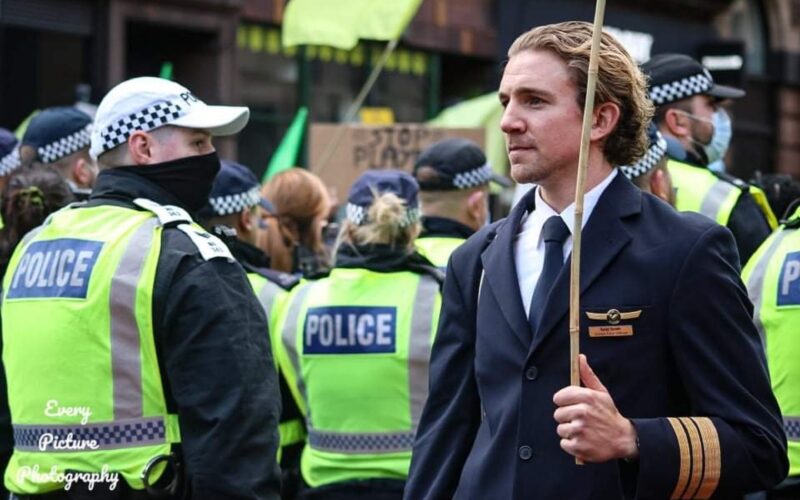Former commercial pilot Todd Smith rose to prominence after joining the environmental group Extinction Rebellion and taking part in protests across the United Kingdom.
A former passenger pilot, who has flown jets for well-known airlines such as Thomas Cook, campaigning against the damage the aviation industry is inflicting on the planet is an extremely powerful image.
It earnt the 34-year-old animosity from his former aviation peers and criticism from those still working in the industry, but since turning his back on flying Smith has not wavered in convictions that airline and plane manufacturers must do more to help the planet.
As well as joining Extinction Rebellion Smith also formed an aviation pressure group called Safe Landing where he and other pilots, cabin crew and engineers from the world of aircraft share the common goal of protecting the Earth from harm caused by jets.
But what changed this young former pilot, who as a boy dreamed of flying planes as he looked up in awe at the Red Arrows whizzing past in formation, into a devout environmentalist challenging the industry he loves?
AeroTime spoke with Smith to understand what shaped his journey from childhood dreams of flying to being medically grounded with Lyme disease and eco-anxiety, before eventually becoming one of Extinction Rebellion’s figureheads
AeroTime: Looking back at your childhood, was aviation something you were always passionate about when you were growing up?
Todd Smith: Yeah, my dad was a bricklayer and it’s quite a challenging career. Work often gets rained off and working on a building site had its adversities you could say. He always said to me to do a job you enjoy. So, I was left sort of pondering that question at quite a young age.
I remember going to Southend Airshow when I was five. I remember seeing the Red Arrows and how everybody on the grass bank had just stopped what they were doing. I was looking up at the sky in awe of these aircraft in formation flying wingtip to wingtip. It was completely inspiring, and I really felt wow, if I did that job, that looks like a lot of fun. So, from that point onwards I set my heart on becoming a pilot.
AT: How did that passion move into flying your first plane?
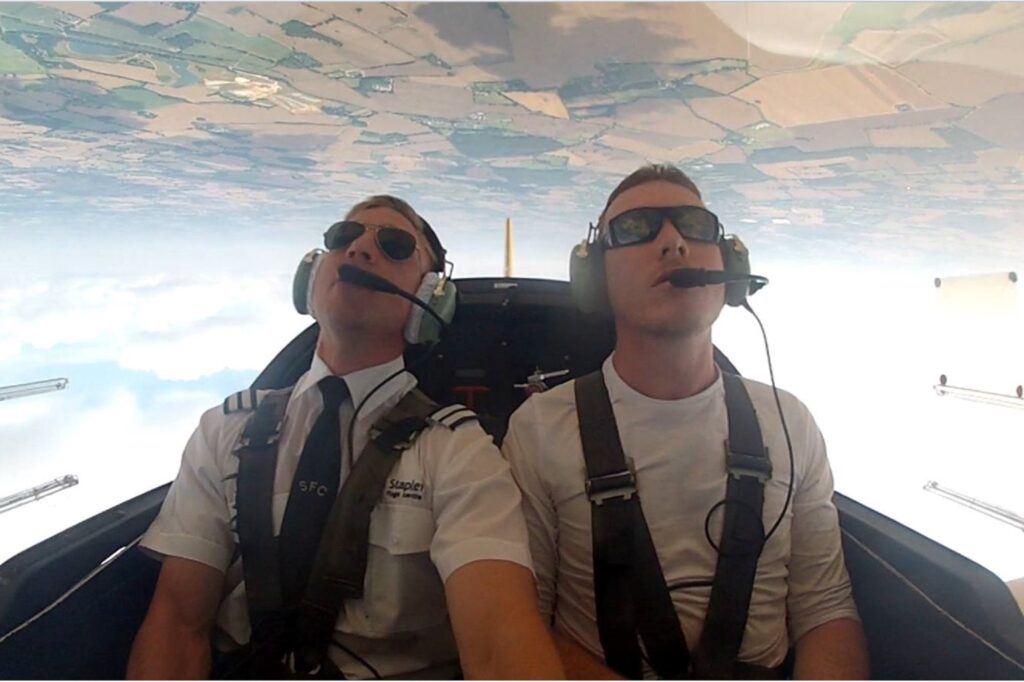
TS: I was always quite military minded, I almost romanticized the military industrial complex through films like Top Gun and Hollywood in general. At the age of 12 I had my first flying lesson at Stapleford Flight Centre, it was a trial lesson.
I then joined the Air Cadets around the age of 14 or 15. I was doing air experience flying, aerobatics and I was recommended for a flying scholarship. I was in quite a small squadron, but nothing ever came of it, so I was a bit disheartened. At this time, I also had undiagnosed Attention-deficit/hyperactivity disorder (ADHD).
AT: Did you apply for the Royal Air Force in the UK?
TS: I didn’t get the straight A grades that were required for the Royal Air Force. So, then I bounced from job to job and ended up starting an electrical apprenticeship after almost going into the army. I felt a bit of a failure, to be honest.
It wasn’t until around the 2008 recession when I was working in an office job that I thought perhaps I could look at the commercial route. Around the age of 21 I took out a loan to complete my private pilot’s license and did really well at the training. My parents could see that I could make this happen.
They decided to get behind me and remortgaged their house. My grandma also helped me out and I moved back in with my parents. It was a massive family effort, very much a working class upbringing. I didn’t feel like I really deserved it at the time. It was also a lot of pressure on my family financially.
AT: What was your first job as a commercial pilot?
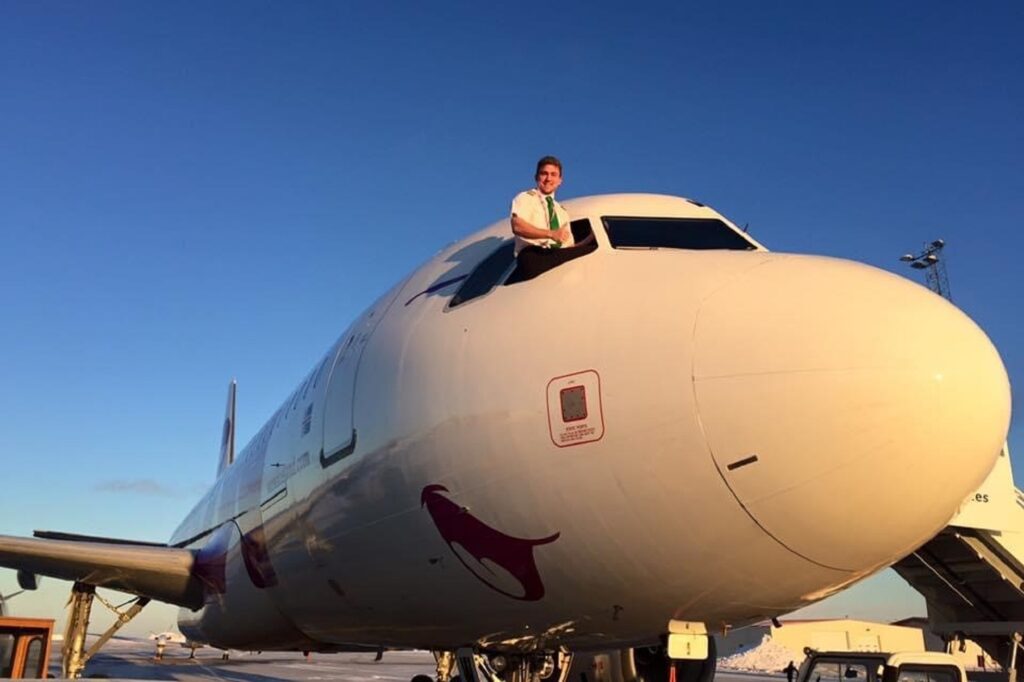
TS: It was with a Bulgarian airline called Air Via which had a summer charter to Bulgaria. They did a lot of ACMI (aircraft, crew, maintenance and insurance) flights. My first flight was in an Airbus A320 from Keflavik in Iceland to Gatwick with Wow Air, which was an ACMI operation through Air Via.
AT: How did you then progress in your career?
TS: I spent a year with Air Via and then Thomas Cook opened up its recruitment and I was really lucky to secure a job as a pilot. It felt like the weight of the world was lifted off my shoulders. I would have happily stayed with them my entire career.
I flew for Thomas Cook for about two and a half years and was promoted to senior first officer. I was recommended for command, and I was offered to go long-haul as well out of Manchester. But just as everything was going so well, in 2018 I had my medical revoked and I was grounded.
AT: That must have been heart breaking for you. I read you were diagnosed with Lyme disease.
TS: It’s complicated. That was one of several things which prolonged my medical grounding. It started with gut trouble. I suffered from chronic diarrhea for a couple of months. When I was in remission from the gut problems some medication, I was taking affected my liver, so I had to wait another few months for that to clear.
Then in September 2019, when I was still grounded, I got bitten by a tick in Richmond Park and I was subsequently diagnosed with Lyme disease. This affected my cognition, I had a real sense of brain fog, arthritis in my bones and it genuinely terrified me.
The last thing on my mind then wasn’t when I was going to fly again, it was whether I was going to be able to think clearly again. I still planned to go back to piloting eventually though. I had £120,000 of debt and a moral obligation to my family who had really put themselves out.
But of course, in September 2019, Thomas Cook went bust while I was still off work with Lyme disease and after I was finally free of Lyme disease, I still had to remain in remission for another six months before I could consider flying again
By the time it was over the COVID-19 pandemic had struck, which was the absolute final straw and meant I’d never fly again.
Officially I am still medically grounded today with eco-anxiety, which has been diagnosed by a psychiatrist at the Civil Aviation Authority (CAA). Although, it’s worth noting that eco-anxiety is not something which you pathologize. It is a perfectly rational and healthy response to an existential threat combined with a lack of action by both government an industry.
AT: Were you still flying when you started feeling conflicted between flying and the environment?
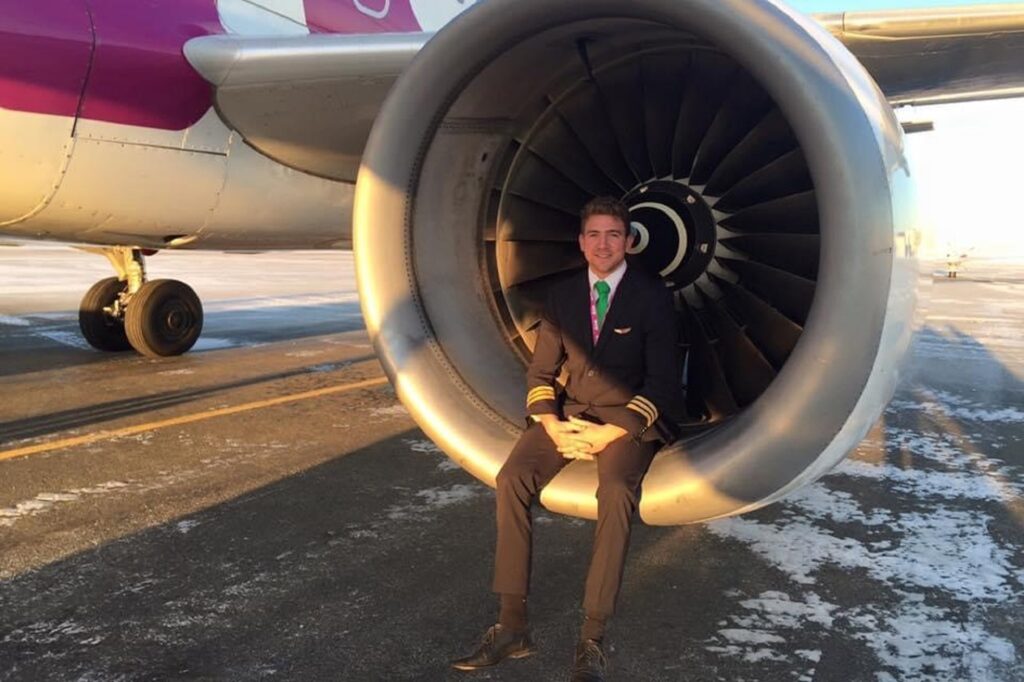
TS: Yes, I couldn’t really piece it all together at the time. I remember before I was medically grounded, I was at Machu Picchu in Peru and then Rainbow Mountain. There were thousands of people on top of this hillside, and I was witnessing mass tourism and a climate event first-hand.
I was being confronted with my privilege. As a working class person that isn’t something I would necessarily class myself as, having a high privilege, given I come from a council estate in Essex.
I also remember my last flight from Gatwick to Dalaman just looking down at the Alps. I noticed the freezing level and the amount of snow left, and there’s this one glacier that appeared so vulnerable and exposed.
I didn’t know then but I was suffering from eco-anxiety, and this deep conflict inside was growing.
AT: How did it move from questioning the affect aviation has on the environment to saying to yourself, ‘I’m not going to be a pilot, I’m not going to go back to, this isn’t going to work for me anymore’?
TS: I had been recommended to go plant based when I had issues with my gut, and then I subsequently went vegan. This was quite early in the period I was medically grounded.
The pandemic made me see the human vulnerability that we experience, and I learnt that the two biggest risk factors for zoonotic disease were deforestation and factory farming of animals.
I just knew at that point that I couldn’t see that there was any representation from workers in carbon heavy industry within the environmental movement.
I just felt that whatever happens next, it’s bigger than my job title and it was clear to me we are on a certain trajectory, the climate science overwhelming. If I follow pilot training, then it’s ‘think free from bias to mitigate risk to preserve life’. So, what’s the right thing to do now?
I believed that if we didn’t take this seriously as an industry, then we’re going to see a much bigger crash to the job market. If we triple our workforce in line with growth until 2050, we’re going to see a much bigger crash to our industry, and loss of jobs than what we witnessed during the pandemic, potentially.
AT: How and when did you start linking up with Extinction Rebellion?
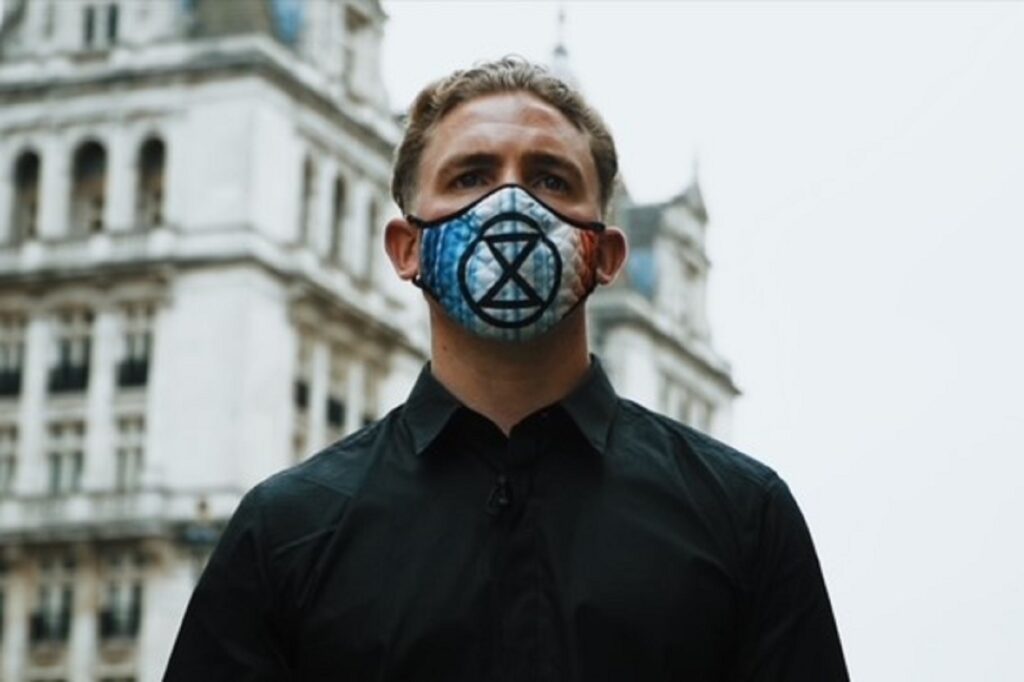
TS: I went to my first ever Extinction Rebellion (XR) local group meeting probably in late 2019. I was very much on the periphery, not really doing too much and not wanting to be too visible.
I was worried about what the group were going to think of me because at this point, I’m still thinking of going back into industry. I still thought we could save the world by buying a Tesla and going on a few less holidays.
Anyway, I said I was a pilot and it transpired that the person sitting next to me was an easyJet cadet. He is no longer with the company and is a member of Safe Land as well.
But what I didn’t know then was this introduction was essentially the beginning of Safe Landing. I was no longer alone and there was another aviation worker with a degree in environmental science who understood this. From there Safe Landing has grown and grown.
AT: What Aviation protests have you taken part in? I know you were involved in one at Luton Airport at the private jet terminal earlier in 2023. Presumably you are also involved in protests not aimed at aviation?
TS: Yeah, absolutely. I was a big part of Animal Rebellion as well. Change around the food system is paramount. We need to rewild massive amounts of land which is currently used in animal agriculture.
I was arrested at the Queen’s Jubilee in 2022 with Animal Rebellion, where we were highlighting that the monarchy owns a sixth of the land around the world. I’ve also been involved in all sorts of areas within XR and Money Rebellion.
Because my experience is in aviation, unfortunately, even though I didn’t really want to, I’ve been the one that people come to and ask questions. It’s such a hard thing for me to do, because I love the industry. I love, love the job.
But at the same time, we’ve got to speak truth, so it’s been difficult. I know I’ve been massively unpopular because of that, but we’re not really doing this to be popular. We’ve just going to speak the truth as best as we understand it now, so that we can ultimately take rapid action and preserve life.
AT: Are you primarily focused on the private jet industry?
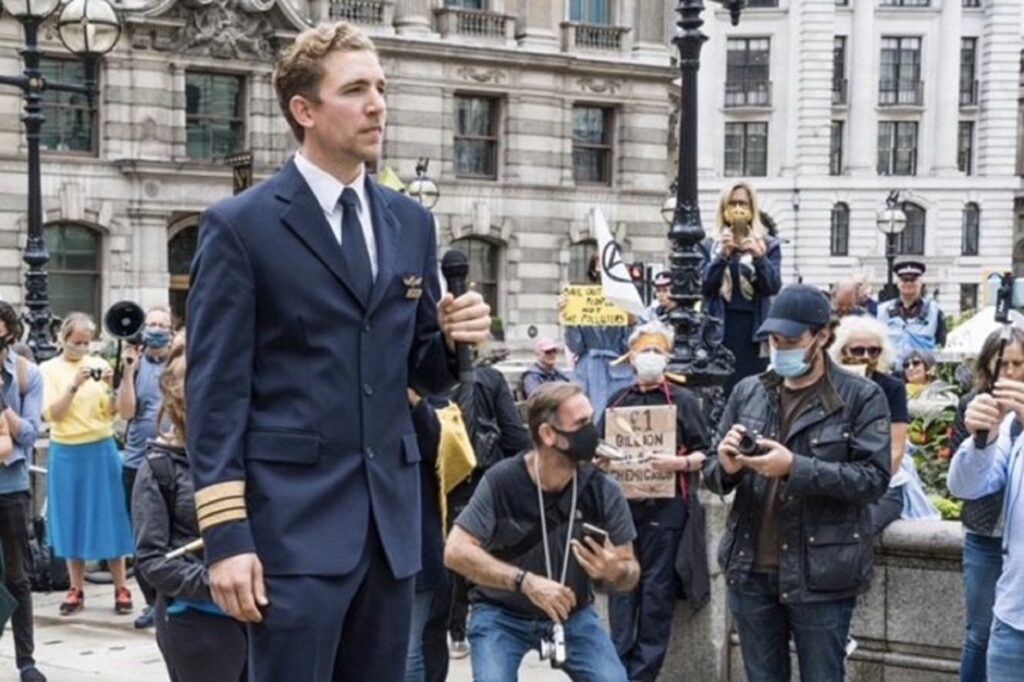
TS: The reason we focus on private jets is because firstly, there was a UK Climate Assembly in 2020, which was a democratic process led by the parliamentary select committees. As a result of that assembly, the members said that we should put a ban on polluting private jets.
It’s also very popular with the public. It’s largely the wealth inequality which exacerbates and it’s such a small minority of people causing the most harm. It isn’t really Stan and Doris that save up their hard-earned cash for that one holiday every year that are the problem.
5% of the global population flies annually, yet we fly four billion passengers across the globe, which is half the population per year.
I think we’re more trying to highlight the need for a tax on jet fuel, so that naturally does target the people that are flying most or a frequent flyer tax levy. Again, that was recommended by the UK climate assembly.
We don’t want to target [the] working class or people that are of course entitled to their holiday and freedom, but mostly the people that are causing most harm and acting recklessly.
AT: Are you planning more protests?
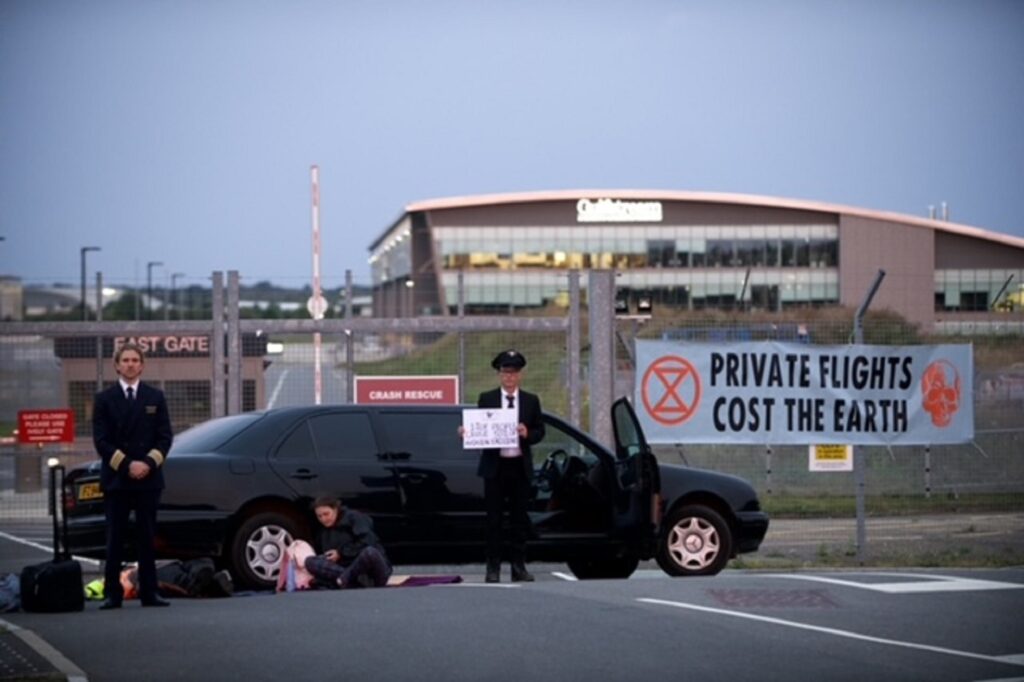
TS: The campaign’s kind of ongoing and ultimately climate activists are not going to stop until the government stop acting in a way, which is essentially genocide. Half of the African population could be displaced by 2030, so if we get real about where we are in history then climate protest is going to continue.
We’d love a worker-led assembly process so that workers can be front and center in deciding what’s best for our industry. We don’t want to dictate what change should happen. I think the deliberative democratic processes are essential to make sure people firstly understand the science because the media and government are failing to get the message out. But secondly, they are empowered to make a decision and it comes from the workers rather than the board.
AT: What would be your message to the aviation industry leaders?
TS: We need to just be humble, and we need to feel that discomfort and embrace the uncertainty of the time that we live in, and ultimately, find our humanity again. We need to reconnect to ourselves, each other and to the natural world like we used to. We used to know how to be a thriving part of ecosystems and work in harmony with the natural world and indigenous people still hold that knowledge.
We’ve become so separated from ourselves, each other and the natural world that we will destroy it if we’re not careful. So, let’s return our humanity and stop arguing amongst ourselves. See each other as equals and get on with the job that needs to be done.

